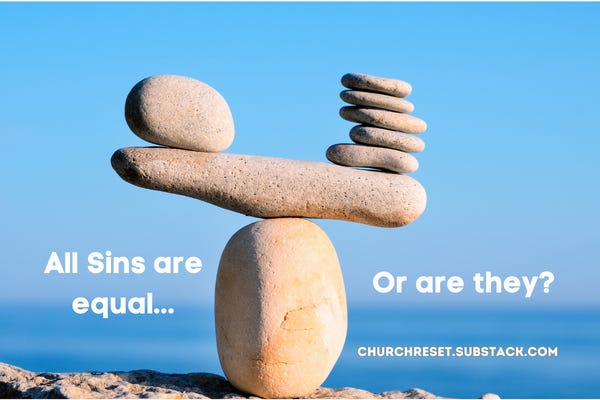All sin is equal... kinda
Why it matters to get this right
Christians often say, “A sin is a sin is a sin” and “All sin can separate us from God.”
One of these two phrases is true.
It is undeniably true that a single sin is enough to cause separation from God and needs atonement, paid for by death (Genesis 3, Romans 6:23, Hebrews 9:22). In that very important sense, all sin is equal. That’s why nobody will be able to stand at the judgment and say “Yeah, but it’s not like I killed somebody” and have it stand up as a valid defense.
But in another sense, the Bible is abundantly clear that God does not view all sins the same.
A ranked system
Looking back to the Law, some sins required a rather small sacrifice to satisfy God. Some sins were viewed as so heinous that the punishment was death, and no amount of sacrificing could get one out of it. If God views all sin equally, why did He not punish them equally?
The heart is taken into account
Notice also with Solomon in 1 Kings 3 - he is largely praised for how he managed the early days of his reign, with one caveat thrown in. "And Solomon loved the Lord, walking in the statutes of his father David, except that he sacrificed and burned incense at the high places" (1 Kings 3:3 NKJV).
Elsewhere, sacrificing at the high places was a grave sin held against kings and the people. But in this instance, it is included as an aside against Solomon, as if to say "Other than this one thing, he was doing great and had God's favor." Indeed, immediately after this comment is when we see God asking the desire of Solomon's heart, and Solomon's wise answer.
What we learn from this is that God is far more lenient on sins committed by those whose heart is generally in the right place and who are regularly doing right. Their downfall is different from someone whose sin is another in a long line of disobediences.
Ignorance vs intentional
The surest form of the heart's entrance into the equation is God's division between intentional and unintentional sins in Leviticus 4. There we're introduced to the concept of the "high handed sin," the sin someone commits brazenly. It's as it they're spitting in God's face and saying "I know it's wrong and I don't care."
Three people can commit the exact same sin in three different ways and face different judgments. One may not know it is wrong. One may know it is wrong and give in at a moment of weakness. Still the other may know it's wrong and gleefully does it anyway. God does not view these three as the same, even though their actions were identical.
The end of the spiral
Romans 1 introduces us to a spiraling departure from God that starts with not giving thanks to Him or acknowledging Him and ends with all manner of depravity and "giving hearty approval to those who practice them."
Lying or taking someone's stuff and other such sins are just about universal to mankind. However, Romans 1 shows actions like homosexuality are not the kinds of sins somebody just decides to engage in one day. There is a level of individual and societal depravity that must be reached before that even becomes thinkable.
Why it matters
First, it affects your assurance. Accepting God's grace is never cover for sinning more (Romans 6:1-2), but it does help us get over the self-loathing so many Christians deal with. When 1 John 1 tells us to walk in the light it explicitly lays out that that does not mean we won't sin. It means we are owning, confessing, and moving on from our sins, and that puts our sin in a whole different category than willful and unrepentant sin. The blood of Jesus continually cleanses you.
Second, it affects our engagement with the world. I've heard Christians say "You know, I've told a lie and that makes me no different than any homosexual." That's simply not true. Others try to score culture war points by playing the card of "You're a sinner, too, so who are you to call somebody else's actions wrong?"
This leads to the well-worn evangelistic strategy of trying to tell the world "We're broken, too."
No, we were broken. By the grace of God, we are not where we once were. And though we are not perfect and never will be in this life, we are outgrowing old sins, repenting of them, and leaving them in the dust.
If the Gospel leaves the 70 year Christian as no different than the most defiant, unbelieving sinner, what power does it have?
So no, not all sins are equal. They are all equally deserving death, and they can all be sufficiently covered by the blood of Christ.
But there is a broad difference in sins in both our hearts and our actions.
This article first appeared on Focus+



Levels of sin ... Genesis 13:13 accuses Sodomites of being sinners exceedingly. John 19:11 records Jesus comparing "greater sin" to Pilate's sin.
Very well said, Jack.